2022年中考英语二轮专题复习:专题8 动词时态(共有60张ppt)
文档属性
| 名称 | 2022年中考英语二轮专题复习:专题8 动词时态(共有60张ppt) |  | |
| 格式 | zip | ||
| 文件大小 | 1.6MB | ||
| 资源类型 | 教案 | ||
| 版本资源 | 人教新目标(Go for it)版 | ||
| 科目 | 英语 | ||
| 更新时间 | 2022-03-22 10:00:26 | ||
图片预览

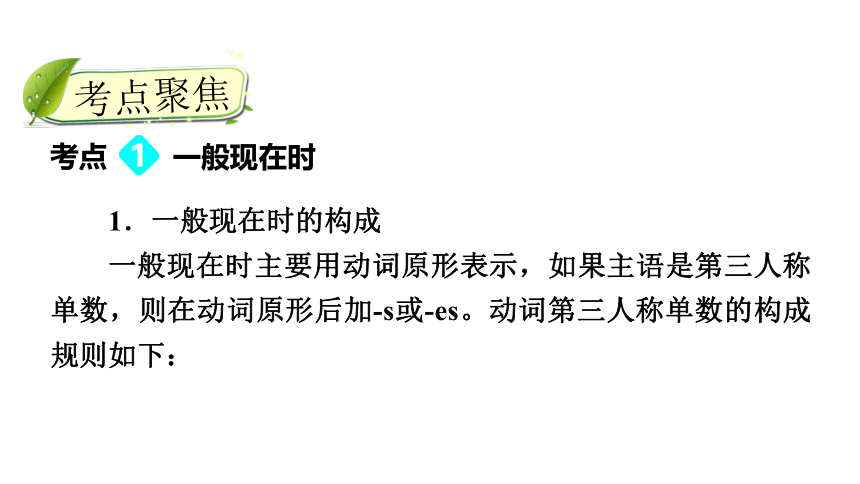
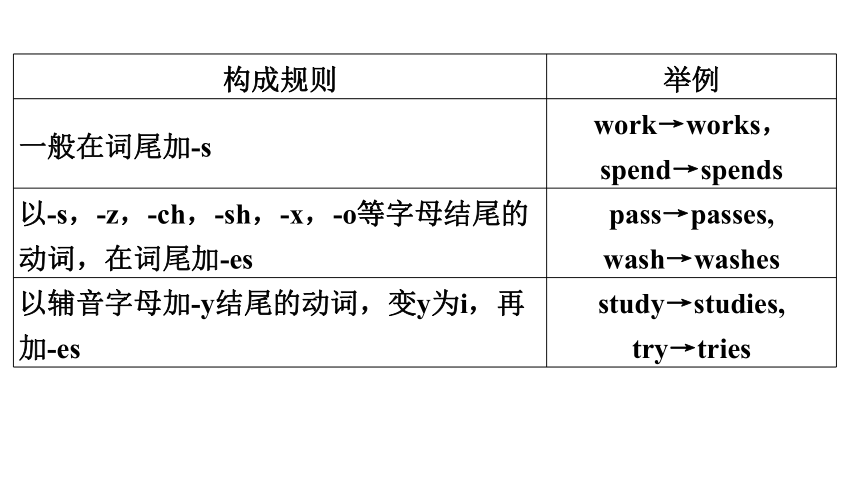

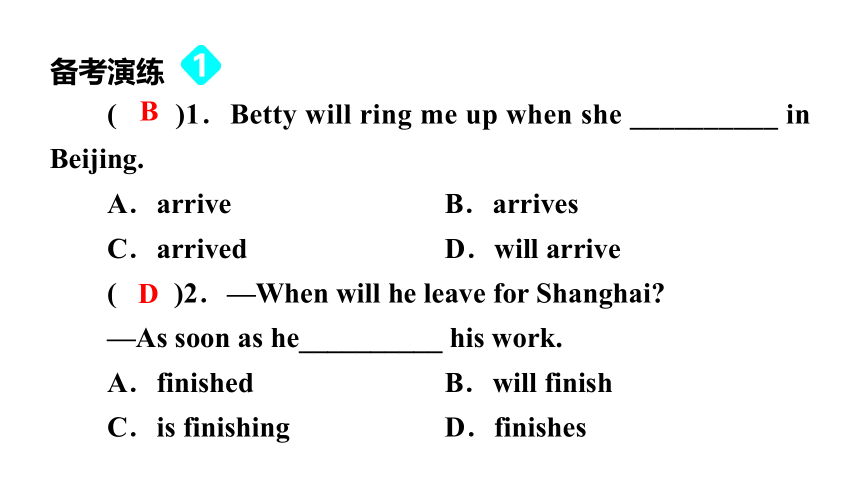
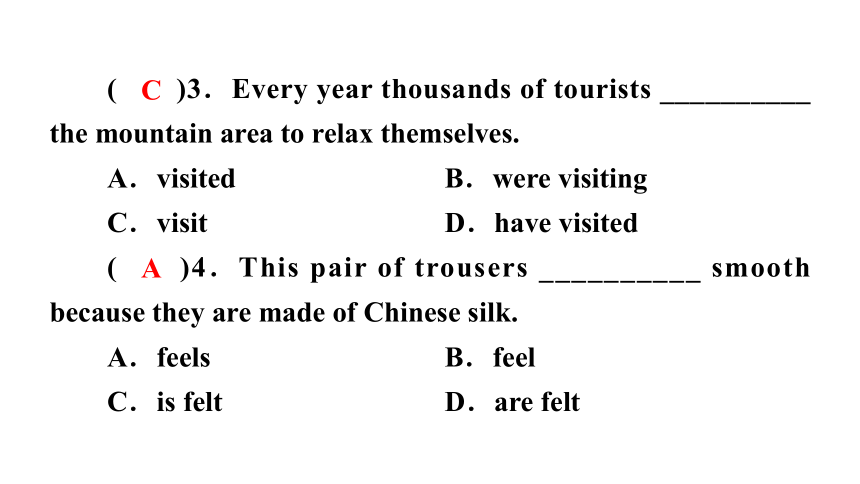
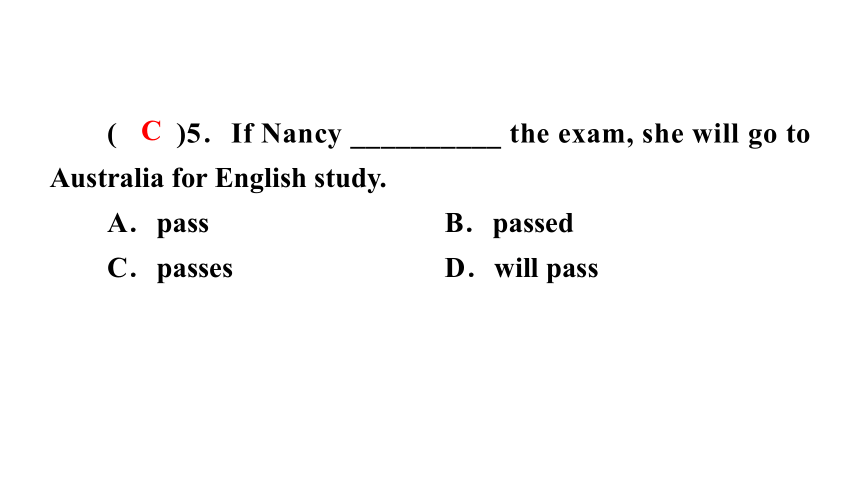
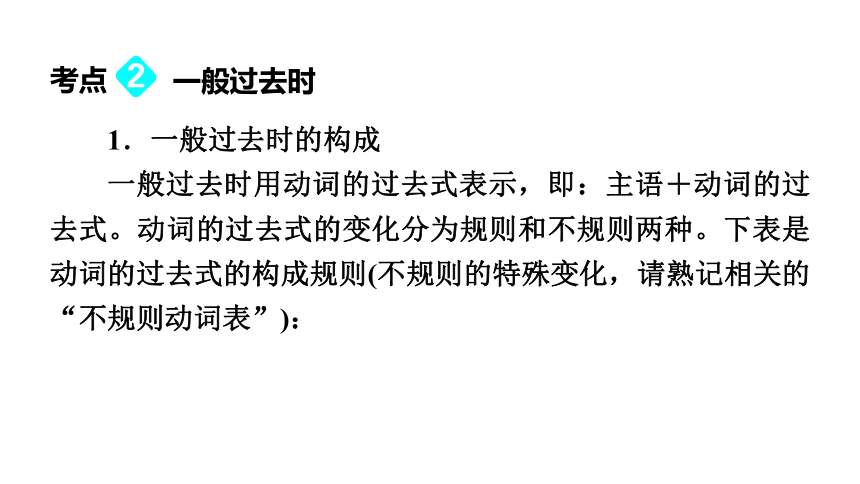
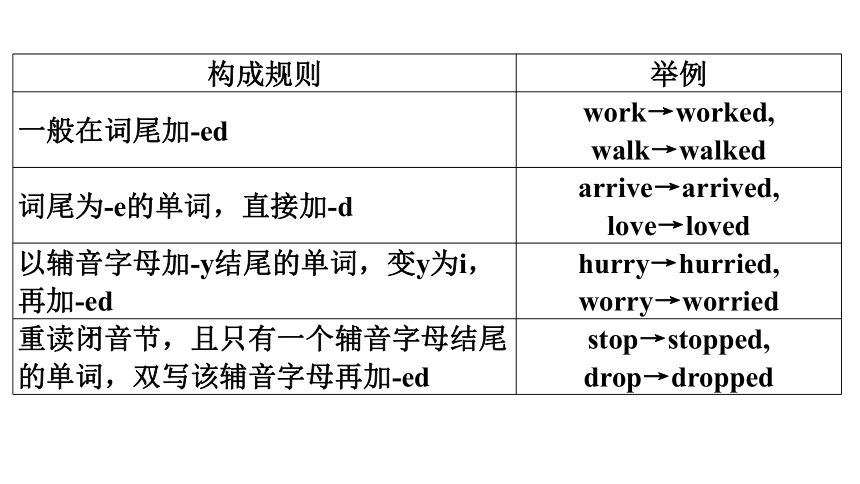
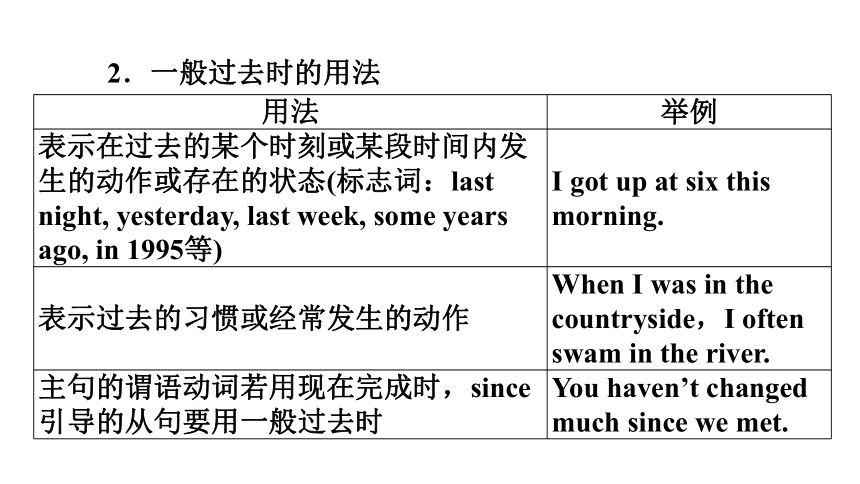
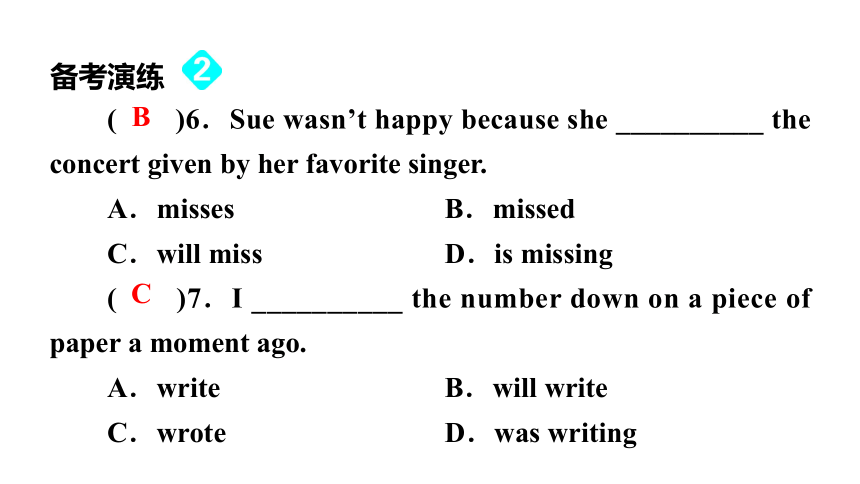

文档简介
(共60张PPT)
第一模块 语法专题突破
专题八 动词时态
考点聚焦
1.一般现在时的构成
一般现在时主要用动词原形表示,如果主语是第三人称单数,则在动词原形后加-s或-es。动词第三人称单数的构成规则如下:
考点
一般现在时
构成规则 举例
一般在词尾加-s work→works,spend→spends
以-s,-z,-ch,-sh,-x,-o等字母结尾的动词,在词尾加-es pass→passes, wash→washes
以辅音字母加-y结尾的动词,变y为i,再加-es study→studies, try→tries
2.一般现在时的用法
用法 举例
表示经常性或习惯性的动作或存在的状态(标志词:often,always,usually,sometimes,every day) I often go to school by bike.
表示客观事实或普遍真理 The Earth goes around the sun.
在时间、条件等状语从句中,用一般现在时表示将来(标志词:as soon as,if,when,unless等) If it rains tomorrow,we won’t go to the park.
( )1.Betty will ring me up when she __________ in Beijing.
A.arrive B.arrives
C.arrived D.will arrive
( )2.—When will he leave for Shanghai
—As soon as he__________ his work.
A.finished B.will finish
C.is finishing D.finishes
备考演练
B
D
( )3.Every year thousands of tourists __________ the mountain area to relax themselves.
A.visited B.were visiting
C.visit D.have visited
( )4.This pair of trousers __________ smooth because they are made of Chinese silk.
A.feels B.feel
C.is felt D.are felt
C
A
( )5.If Nancy __________ the exam, she will go to Australia for English study.
A.pass B.passed
C.passes D.will pass
C
1.一般过去时的构成
一般过去时用动词的过去式表示,即:主语+动词的过去式。动词的过去式的变化分为规则和不规则两种。下表是动词的过去式的构成规则(不规则的特殊变化,请熟记相关的“不规则动词表”):
考点
一般过去时
构成规则 举例
一般在词尾加-ed work→worked, walk→walked
词尾为-e的单词,直接加-d arrive→arrived, love→loved
以辅音字母加-y结尾的单词,变y为i,再加-ed hurry→hurried, worry→worried
重读闭音节,且只有一个辅音字母结尾的单词,双写该辅音字母再加-ed stop→stopped, drop→dropped
2.一般过去时的用法
用法 举例
表示在过去的某个时刻或某段时间内发生的动作或存在的状态(标志词:last night, yesterday, last week, some years ago, in 1995等) I got up at six this morning.
表示过去的习惯或经常发生的动作 When I was in the countryside,I often swam in the river.
主句的谓语动词若用现在完成时,since引导的从句要用一般过去时 You haven’t changed much since we met.
( )6.Sue wasn’t happy because she __________ the concert given by her favorite singer.
A.misses B.missed
C.will miss D.is missing
( )7.I __________ the number down on a piece of paper a moment ago.
A.write B.will write
C.wrote D.was writing
备考演练
B
C
( )8.There was a strange sound outside. Mary went out and ____________ around, but she __________ nothing.
A.looked; saw B.looks; sees
C.will look; sees D.have looked; seen
( )9.My parents and I __________ trees last Sunday.
A.plant B.will plant
C.are planting D.planted
A
D
( )10.—Hello, Mum. Are you still on Lushan Mountain
—Oh, no. We’re back to the hotel. We __________ a really good journey.
A.have B.had
C.are having D.will have
B
1.一般将来时的构成
一般将来时通常用“主语+will/be going to+动词原形”来表示,有些动词用“主语+be doing”形式来表示。
考点
一般将来时
2.一般将来时的用法
( )11.With the development of science and technology, robot cooks __________ in our families in the future.
A.appear B.appeared
C.will appear D.were appearing
备考演练
C
( )12.If our government __________ attention to controlling food safety now, our health __________ in danger.
A.won’t pay; is B.doesn’t pay; is
C.won’t pay; will be D.doesn’t pay; will be
( )13.—I __________ to Hainan on vacation with my parents this coming summer holiday.
—That’s great!
A.go B.went
C.will go D.have gone
D
C
( )14.—Jenny, do you know if your mother __________ back tomorrow
—Sorry, I don’t know.As soon as she __________ home, I will tell her to call you.
A.comes; gets B.will come; gets to
C.will come; will get D.will come; gets
D
( )15. —Have you returned the magazine to the library yet
—Not yet. Don’t worry. I __________ it soon.
A.return B.returned
C.have returned D.will return
D
1.现在进行时的构成
现在进行时的构成:主语+be(am/is/are)+动词的现在分词。动词的现在分词的构成规则如下表所示:
考点
现在进行时
构成规则 举例
1.一般在词尾加-ing sleep→sleeping,study→studying
2.以不发音的-e结尾的动词,需要去掉e后再加-ing dance→dancing, come→coming
3.以重读闭音节结尾且末尾只有一个辅音字母时,要双写该辅音字母,再加-ing put→putting, stop→stopping
4.少数以-ie结尾的单音节动词,需变ie为y后,再加-ing tie→tying, lie→lying
2.现在进行时的用法
( )16.Don’t disturb Allen now. He __________ for the Spelling Bee Competition.
A.prepares B.prepared
C.is preparing D.will prepare
备考演练
C
( )17.Today’s young people can’t live without smart phones. They keep their hands on the phones whenever they go,even while they __________ meals.
A.had B.will have
C.are having D.were having
( )18.—Alan,it’s late. Why not go to bed
—Jenny hasn’t come back yet. I __________ for her.
A.waited B.has waited
C.am waiting D.was waiting
C
C
( )19.Listen! Our science teacher __________ the use of the robot.
A.explains B.explained
C.is explaining D.has explained
( )20.—What’s the terrible noise
—It’s John.He __________ the violin.
A.practiced B.is practicing
C.was practicing D.has practiced
C
B
1.过去进行时的构成
过去进行时的构成形式为:主语+be(was/were)+动词的现在分词
考点
过去进行时
2.过去进行时的用法
( )21.She ______ lunch at home this time yesterday.
A.was having B.have
C.has D.had
备考演练
A
( )22.I __________ at college while my brother was teaching at university.
A.studied B.was studying
C.am studying D.have studied
( )23.Jenny __________ in the kitchen when you called her at 5 o’clock this afternoon.
A.is cooking B.was cooking
C.cooks D.cooked
B
B
( )24.—I didn’t see you at the meeting yesterday. Why
—I __________ a long distance call to my son in Canada.
A.made B.am making
C.have made D.was making
D
( )25. —Mr.Lee __________ to students when I entered the office this morning.
—He is very patient though he is young.
A.is talking B.talks
C.was talking D.talked
C
1.现在完成时的构成
现在完成时的构成:主语+have/has+动词的过去分词。否定句应在have/has后加not变为haven’t/hasn’t;疑问句应将have/has放到句子主语之前。
考点
现在完成时
2.现在完成时的用法
(1)表示过去发生的动作对现在造成的影响或结果。如:
I have already watched the TV play.
(2)表示动作或状态在过去已经开始,持续到现在,也许还要持续下去,常与for或since连用,此时需要用延续性动词。如:
We have lived here since 2000. (说明一直住在这里,也许还会继续住下去)
(3)现在完成时常见的时间标志词:already,yet,ever,never,before,since 2000,for twenty years
3.常见短暂性动词和延续性动词
?知识延伸
①for后接时间段,since后接表示过去的时间点或时间状语从句。对时间状语提问时,常用how long。如:
I’ve known Li Lei for five years. = I’ve known Li Lei since five years ago.
②have gone to,have been to与have been in的区别。
have been to意为“去过某地”(表示去过,现在已经回来了),常与ever,never,twice等词连用;
have gone to意为“去了某地”(表示去了某地,现在人不在这儿),只能用于对话双方所指的第三人称;
have been in意为“在某地待了多久”(强调过去到现在一直待在某地),通常与一段时间连用。
( )26.—How do we turn on the oven
—I __________ you. Weren’t you listening
A.tell B.am telling
C.will tell D.have told
备考演练
D
( )27.Mr.Smith __________ Chinese for two years. He’s much better at it now.
A.learns B.was learning
C.has learned D.will learn
( )28.School violence (暴力)__________ much attention of the whole society and people are calling on the government to make laws against it as early as possible.
A.drew B.will draw
C.has drawn D.was drawing
C
C
( )29.Lei Feng __________ for many years,but his spirit is still encouraging us.
A.died B.has died
C.was dead D.has been dead
( )30.—What do you think of the new foreign teacher Thomson
—Pretty good. I think he __________ a great job so far.
A.does B.did
C.has done D.was done
D
C
※易混淆考点分析
Ⅰ.一般过去时与过去进行时混用
注意两种时态的用法和区别。
( )1.—Why didn’t you answer my call
—I __________ the car at that time.
A.will drive B.has driven
C.drove D.was driving
D
( )2.—Hainan is a good place for surfing.
—That’s why I__________ there for surfing last summer.
A.have been B.have gone
C.was going D.went
D
Ⅱ.一般过去时与过去完成时混用
注意两种时态的用法和区别。
( )3.—You can’t smoke here. Look at the sign “No smoking”!
—Sorry. I __________ it.
A.don’t see B.didn’t see
C.won’t see D.hadn’t seen
B
( )4.My uncle left Beijing in 2001,and since then he __________ in Guangzhou.
A.lives B.lived
C.has lived D.have lived
C
Ⅲ.延续性动词与短暂性动词混用
短暂性动词用于完成时态时,不能与表示一段时间的状语连用,应转换为延续性动词。
( )5.—Oh, Mr.Green, your watch looks very nice. Is it new
—No, I __________ it since three years ago.
A.have bought B.had
C.bought D.have had
D
真题再现
广东省卷
( )1.(2021语法选择,37)Now, the city is hoping that the bridge __________ lots of tourists to the area.
A.brought B.will bring
C.is bringing D.was bringing
B
( )2.(2021完形填空,48)Bill ended the letter with some warm words, __________ Sam to study hard and do well in school.
A.warning B.helping
C.ordering D.encouraging
D
他山之石
( )1.(2020北京)If you take this train, you ________ in Shanghai in five hours.
A.arrive B.will arrive
C.arrived D.have arrived
( )2.(2020黔西南州)While Mike __________ computer games in his room, his dad came in.
A.is playing B.was playing
C.will play D.plays
B
B
( )3.(2021大连)Lingling met her favourite presenter while she __________ the radio station.
A.visits B.will visit
C.is visiting D.was visiting
( )4.(2021广西)China ________ great achievements in science and technology since 1978.
A.makes B.made
C.has made D.is made
D
C
( )5.(2021南通)—Miss Zhang seems quite familiar with Yunnan Province.
—Don’t you know She __________ a town school there as a volunteer teacher for over 2 years.
A.is in B.has gone to
C.has been in D.has been to
D
模拟提升
A.短文填空基础练
1.The second C919 large passenger plane ____________ its first flight at Shanghai Pudong International Airport on December 17th, 2017.
2.The film Operation Red Sea __________ a lot of praise since its first show months ago.
completed
has won
3.Though Mr.Li _____________________ his hometown for over ten years,he misses his old friends from time to time.
4.My sister ________ the piano very well,but she hasn’t had time to play recently.
5.(改编)We wonder if our parents will come to our graduating party next weekend. If they _______ , we’ll be very glad.
has been away from
plays
come
6.David is a tennis player. He ________________ to play tennis when he was six years old.
7.Liu Changjian,the command pilot of Sichuan Airlines Hight 3U8633,successfully __________ down the plane last month.
8.Mary _______________ the blackboard when the math teacher came into the classroom.
began/started
brought
was cleaning
9.(改编)On January 29th, 2020, Zhong Nanshan and his team ________ over four hours online checking five patients who were seriously ill, and made a treatment plan for those patients.
10.The Chinese SkyEye and High-speed Train interest people around the world a lot. Because both of them ______________ the world in science and technology.
spent
are leading
B.语法选择专练
Long long ago, there lived a lion in the forest.One morning his wife __1__ him that his breath was bad.The lion became embarrassed and angry.He wanted __2__ this fact with others.So he called three others outside his house.
First came the sheep.The lion opened his mouth wide and __3__ the sheep how his mouth smelt.The sheep thought that the lion wanted an honest answer, so he said, “Yes, friend.There seems to be something wrong with your breath.” The answer did not go well with the lion.He killed the sheep angrily.
Then the lion called the wolf and said, “What do you __4__? Do I have a bad breath?” The wolf __5__ what happened to the sheep.He wanted to be very careful in answering the question.So, the wolf said, “Who __6__ that your breath is unpleasant It’s as sweet as the smell of roses.” When the lion __7__ the wolf’s reply, he killed the wolf angrily at once.“The flatterer(奉承者)!” said the lion.Finally, __8__ the turn of the fox.The lion asked him the same question.
The fox had seen that the sheep and the wolf were killed by the lion.So he __9__ and cleared his throat again and again and then said, “Oh, dear friend, for the last few days, I __10__ a very bad cold.Because of this, I can’t smell anything pleasant or unpleasant.”
The lion spared(饶恕) the fox’s life.
( )1.A.told B.have told
C.will tell D.tells
( )2.A.check B.checking
C.checked D.to check
( )3.A.to ask B.was asking
C.asked D.asks
( )4.A.think B.thought
C.thinking D.thinks
A
D
C
A
( )5.A.see B.saw
C.would see D.is seeing
( )6.A.say B.says
C.to say D.saying
( )7.A.hearing B.hears
C.heard D.to hear
( )8.A.came B.comes
C.will come D.has come
B
B
C
A
( )9.A.coughs B.have coughed
C.coughed D.is coughing
( )10.A.had B.have had
C.have D.will have
C
B
第一模块 语法专题突破
专题八 动词时态
考点聚焦
1.一般现在时的构成
一般现在时主要用动词原形表示,如果主语是第三人称单数,则在动词原形后加-s或-es。动词第三人称单数的构成规则如下:
考点
一般现在时
构成规则 举例
一般在词尾加-s work→works,spend→spends
以-s,-z,-ch,-sh,-x,-o等字母结尾的动词,在词尾加-es pass→passes, wash→washes
以辅音字母加-y结尾的动词,变y为i,再加-es study→studies, try→tries
2.一般现在时的用法
用法 举例
表示经常性或习惯性的动作或存在的状态(标志词:often,always,usually,sometimes,every day) I often go to school by bike.
表示客观事实或普遍真理 The Earth goes around the sun.
在时间、条件等状语从句中,用一般现在时表示将来(标志词:as soon as,if,when,unless等) If it rains tomorrow,we won’t go to the park.
( )1.Betty will ring me up when she __________ in Beijing.
A.arrive B.arrives
C.arrived D.will arrive
( )2.—When will he leave for Shanghai
—As soon as he__________ his work.
A.finished B.will finish
C.is finishing D.finishes
备考演练
B
D
( )3.Every year thousands of tourists __________ the mountain area to relax themselves.
A.visited B.were visiting
C.visit D.have visited
( )4.This pair of trousers __________ smooth because they are made of Chinese silk.
A.feels B.feel
C.is felt D.are felt
C
A
( )5.If Nancy __________ the exam, she will go to Australia for English study.
A.pass B.passed
C.passes D.will pass
C
1.一般过去时的构成
一般过去时用动词的过去式表示,即:主语+动词的过去式。动词的过去式的变化分为规则和不规则两种。下表是动词的过去式的构成规则(不规则的特殊变化,请熟记相关的“不规则动词表”):
考点
一般过去时
构成规则 举例
一般在词尾加-ed work→worked, walk→walked
词尾为-e的单词,直接加-d arrive→arrived, love→loved
以辅音字母加-y结尾的单词,变y为i,再加-ed hurry→hurried, worry→worried
重读闭音节,且只有一个辅音字母结尾的单词,双写该辅音字母再加-ed stop→stopped, drop→dropped
2.一般过去时的用法
用法 举例
表示在过去的某个时刻或某段时间内发生的动作或存在的状态(标志词:last night, yesterday, last week, some years ago, in 1995等) I got up at six this morning.
表示过去的习惯或经常发生的动作 When I was in the countryside,I often swam in the river.
主句的谓语动词若用现在完成时,since引导的从句要用一般过去时 You haven’t changed much since we met.
( )6.Sue wasn’t happy because she __________ the concert given by her favorite singer.
A.misses B.missed
C.will miss D.is missing
( )7.I __________ the number down on a piece of paper a moment ago.
A.write B.will write
C.wrote D.was writing
备考演练
B
C
( )8.There was a strange sound outside. Mary went out and ____________ around, but she __________ nothing.
A.looked; saw B.looks; sees
C.will look; sees D.have looked; seen
( )9.My parents and I __________ trees last Sunday.
A.plant B.will plant
C.are planting D.planted
A
D
( )10.—Hello, Mum. Are you still on Lushan Mountain
—Oh, no. We’re back to the hotel. We __________ a really good journey.
A.have B.had
C.are having D.will have
B
1.一般将来时的构成
一般将来时通常用“主语+will/be going to+动词原形”来表示,有些动词用“主语+be doing”形式来表示。
考点
一般将来时
2.一般将来时的用法
( )11.With the development of science and technology, robot cooks __________ in our families in the future.
A.appear B.appeared
C.will appear D.were appearing
备考演练
C
( )12.If our government __________ attention to controlling food safety now, our health __________ in danger.
A.won’t pay; is B.doesn’t pay; is
C.won’t pay; will be D.doesn’t pay; will be
( )13.—I __________ to Hainan on vacation with my parents this coming summer holiday.
—That’s great!
A.go B.went
C.will go D.have gone
D
C
( )14.—Jenny, do you know if your mother __________ back tomorrow
—Sorry, I don’t know.As soon as she __________ home, I will tell her to call you.
A.comes; gets B.will come; gets to
C.will come; will get D.will come; gets
D
( )15. —Have you returned the magazine to the library yet
—Not yet. Don’t worry. I __________ it soon.
A.return B.returned
C.have returned D.will return
D
1.现在进行时的构成
现在进行时的构成:主语+be(am/is/are)+动词的现在分词。动词的现在分词的构成规则如下表所示:
考点
现在进行时
构成规则 举例
1.一般在词尾加-ing sleep→sleeping,study→studying
2.以不发音的-e结尾的动词,需要去掉e后再加-ing dance→dancing, come→coming
3.以重读闭音节结尾且末尾只有一个辅音字母时,要双写该辅音字母,再加-ing put→putting, stop→stopping
4.少数以-ie结尾的单音节动词,需变ie为y后,再加-ing tie→tying, lie→lying
2.现在进行时的用法
( )16.Don’t disturb Allen now. He __________ for the Spelling Bee Competition.
A.prepares B.prepared
C.is preparing D.will prepare
备考演练
C
( )17.Today’s young people can’t live without smart phones. They keep their hands on the phones whenever they go,even while they __________ meals.
A.had B.will have
C.are having D.were having
( )18.—Alan,it’s late. Why not go to bed
—Jenny hasn’t come back yet. I __________ for her.
A.waited B.has waited
C.am waiting D.was waiting
C
C
( )19.Listen! Our science teacher __________ the use of the robot.
A.explains B.explained
C.is explaining D.has explained
( )20.—What’s the terrible noise
—It’s John.He __________ the violin.
A.practiced B.is practicing
C.was practicing D.has practiced
C
B
1.过去进行时的构成
过去进行时的构成形式为:主语+be(was/were)+动词的现在分词
考点
过去进行时
2.过去进行时的用法
( )21.She ______ lunch at home this time yesterday.
A.was having B.have
C.has D.had
备考演练
A
( )22.I __________ at college while my brother was teaching at university.
A.studied B.was studying
C.am studying D.have studied
( )23.Jenny __________ in the kitchen when you called her at 5 o’clock this afternoon.
A.is cooking B.was cooking
C.cooks D.cooked
B
B
( )24.—I didn’t see you at the meeting yesterday. Why
—I __________ a long distance call to my son in Canada.
A.made B.am making
C.have made D.was making
D
( )25. —Mr.Lee __________ to students when I entered the office this morning.
—He is very patient though he is young.
A.is talking B.talks
C.was talking D.talked
C
1.现在完成时的构成
现在完成时的构成:主语+have/has+动词的过去分词。否定句应在have/has后加not变为haven’t/hasn’t;疑问句应将have/has放到句子主语之前。
考点
现在完成时
2.现在完成时的用法
(1)表示过去发生的动作对现在造成的影响或结果。如:
I have already watched the TV play.
(2)表示动作或状态在过去已经开始,持续到现在,也许还要持续下去,常与for或since连用,此时需要用延续性动词。如:
We have lived here since 2000. (说明一直住在这里,也许还会继续住下去)
(3)现在完成时常见的时间标志词:already,yet,ever,never,before,since 2000,for twenty years
3.常见短暂性动词和延续性动词
?知识延伸
①for后接时间段,since后接表示过去的时间点或时间状语从句。对时间状语提问时,常用how long。如:
I’ve known Li Lei for five years. = I’ve known Li Lei since five years ago.
②have gone to,have been to与have been in的区别。
have been to意为“去过某地”(表示去过,现在已经回来了),常与ever,never,twice等词连用;
have gone to意为“去了某地”(表示去了某地,现在人不在这儿),只能用于对话双方所指的第三人称;
have been in意为“在某地待了多久”(强调过去到现在一直待在某地),通常与一段时间连用。
( )26.—How do we turn on the oven
—I __________ you. Weren’t you listening
A.tell B.am telling
C.will tell D.have told
备考演练
D
( )27.Mr.Smith __________ Chinese for two years. He’s much better at it now.
A.learns B.was learning
C.has learned D.will learn
( )28.School violence (暴力)__________ much attention of the whole society and people are calling on the government to make laws against it as early as possible.
A.drew B.will draw
C.has drawn D.was drawing
C
C
( )29.Lei Feng __________ for many years,but his spirit is still encouraging us.
A.died B.has died
C.was dead D.has been dead
( )30.—What do you think of the new foreign teacher Thomson
—Pretty good. I think he __________ a great job so far.
A.does B.did
C.has done D.was done
D
C
※易混淆考点分析
Ⅰ.一般过去时与过去进行时混用
注意两种时态的用法和区别。
( )1.—Why didn’t you answer my call
—I __________ the car at that time.
A.will drive B.has driven
C.drove D.was driving
D
( )2.—Hainan is a good place for surfing.
—That’s why I__________ there for surfing last summer.
A.have been B.have gone
C.was going D.went
D
Ⅱ.一般过去时与过去完成时混用
注意两种时态的用法和区别。
( )3.—You can’t smoke here. Look at the sign “No smoking”!
—Sorry. I __________ it.
A.don’t see B.didn’t see
C.won’t see D.hadn’t seen
B
( )4.My uncle left Beijing in 2001,and since then he __________ in Guangzhou.
A.lives B.lived
C.has lived D.have lived
C
Ⅲ.延续性动词与短暂性动词混用
短暂性动词用于完成时态时,不能与表示一段时间的状语连用,应转换为延续性动词。
( )5.—Oh, Mr.Green, your watch looks very nice. Is it new
—No, I __________ it since three years ago.
A.have bought B.had
C.bought D.have had
D
真题再现
广东省卷
( )1.(2021语法选择,37)Now, the city is hoping that the bridge __________ lots of tourists to the area.
A.brought B.will bring
C.is bringing D.was bringing
B
( )2.(2021完形填空,48)Bill ended the letter with some warm words, __________ Sam to study hard and do well in school.
A.warning B.helping
C.ordering D.encouraging
D
他山之石
( )1.(2020北京)If you take this train, you ________ in Shanghai in five hours.
A.arrive B.will arrive
C.arrived D.have arrived
( )2.(2020黔西南州)While Mike __________ computer games in his room, his dad came in.
A.is playing B.was playing
C.will play D.plays
B
B
( )3.(2021大连)Lingling met her favourite presenter while she __________ the radio station.
A.visits B.will visit
C.is visiting D.was visiting
( )4.(2021广西)China ________ great achievements in science and technology since 1978.
A.makes B.made
C.has made D.is made
D
C
( )5.(2021南通)—Miss Zhang seems quite familiar with Yunnan Province.
—Don’t you know She __________ a town school there as a volunteer teacher for over 2 years.
A.is in B.has gone to
C.has been in D.has been to
D
模拟提升
A.短文填空基础练
1.The second C919 large passenger plane ____________ its first flight at Shanghai Pudong International Airport on December 17th, 2017.
2.The film Operation Red Sea __________ a lot of praise since its first show months ago.
completed
has won
3.Though Mr.Li _____________________ his hometown for over ten years,he misses his old friends from time to time.
4.My sister ________ the piano very well,but she hasn’t had time to play recently.
5.(改编)We wonder if our parents will come to our graduating party next weekend. If they _______ , we’ll be very glad.
has been away from
plays
come
6.David is a tennis player. He ________________ to play tennis when he was six years old.
7.Liu Changjian,the command pilot of Sichuan Airlines Hight 3U8633,successfully __________ down the plane last month.
8.Mary _______________ the blackboard when the math teacher came into the classroom.
began/started
brought
was cleaning
9.(改编)On January 29th, 2020, Zhong Nanshan and his team ________ over four hours online checking five patients who were seriously ill, and made a treatment plan for those patients.
10.The Chinese SkyEye and High-speed Train interest people around the world a lot. Because both of them ______________ the world in science and technology.
spent
are leading
B.语法选择专练
Long long ago, there lived a lion in the forest.One morning his wife __1__ him that his breath was bad.The lion became embarrassed and angry.He wanted __2__ this fact with others.So he called three others outside his house.
First came the sheep.The lion opened his mouth wide and __3__ the sheep how his mouth smelt.The sheep thought that the lion wanted an honest answer, so he said, “Yes, friend.There seems to be something wrong with your breath.” The answer did not go well with the lion.He killed the sheep angrily.
Then the lion called the wolf and said, “What do you __4__? Do I have a bad breath?” The wolf __5__ what happened to the sheep.He wanted to be very careful in answering the question.So, the wolf said, “Who __6__ that your breath is unpleasant It’s as sweet as the smell of roses.” When the lion __7__ the wolf’s reply, he killed the wolf angrily at once.“The flatterer(奉承者)!” said the lion.Finally, __8__ the turn of the fox.The lion asked him the same question.
The fox had seen that the sheep and the wolf were killed by the lion.So he __9__ and cleared his throat again and again and then said, “Oh, dear friend, for the last few days, I __10__ a very bad cold.Because of this, I can’t smell anything pleasant or unpleasant.”
The lion spared(饶恕) the fox’s life.
( )1.A.told B.have told
C.will tell D.tells
( )2.A.check B.checking
C.checked D.to check
( )3.A.to ask B.was asking
C.asked D.asks
( )4.A.think B.thought
C.thinking D.thinks
A
D
C
A
( )5.A.see B.saw
C.would see D.is seeing
( )6.A.say B.says
C.to say D.saying
( )7.A.hearing B.hears
C.heard D.to hear
( )8.A.came B.comes
C.will come D.has come
B
B
C
A
( )9.A.coughs B.have coughed
C.coughed D.is coughing
( )10.A.had B.have had
C.have D.will have
C
B
同课章节目录
- 词法
- 名词
- 动词和动词短语
- 动词语态
- 动词时态
- 助动词和情态动词
- 非谓语动词
- 冠词
- 代词
- 数词和量词
- 形容词副词及其比较等级
- 介词和介词短语
- 连词和感叹词
- 构词法
- 相似、相近词比较
- 句法
- 陈述句
- 一般疑问句和否定疑问句
- 特殊疑问句及选择疑问句
- 反意疑问句
- 存在句(There be句型)
- 宾语从句
- 定语从句
- 状语从句
- 主谓一致问题
- 简单句
- 并列句
- 复合句
- 主谓一致
- 主、表语从句
- 名词性从句
- 直接引语和间接引语
- 虚拟语气
- 感叹句
- 强调句
- 倒装句
- 祈使句
- 句子的成分
- 句子的分类
- 题型专区
- 单项选择部分
- 易错题
- 完形填空
- 阅读理解
- 词汇练习
- 听说训练
- 句型转换
- 补全对话
- 短文改错
- 翻译
- 书面表达
- 任务型阅读
- 语法填空
- 其他资料
